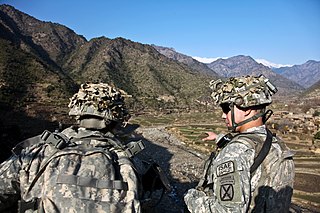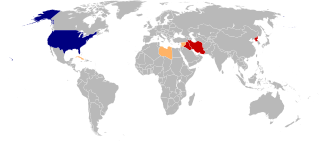
Camp David is a 125-acre (51 ha) country retreat for the president of the United States. It lies in the wooded hills of Catoctin Mountain Park, in Frederick County, Maryland, near the towns of Thurmont and Emmitsburg, about 62 miles (100 km) north-northwest of the national capital city, Washington, D.C. It is code-named Naval Support Facility Thurmont. Technically a military installation, it is staffed primarily by the Seabees, the Civil Engineer Corps (CEC), the United States Navy, and the United States Marine Corps. Naval construction battalions are tasked with Camp David construction and send detachments as needed.

Operation Enduring Freedom (OEF) was the official name used by the U.S. government for both the first stage (2001–2014) of the War in Afghanistan (2001–2021) and the larger-scale Global War on Terrorism. On 7 October 2001, in response to the September 11 attacks, President George W. Bush announced that airstrikes against Al-Qaeda and the Taliban had begun in Afghanistan. Beyond the military actions in Afghanistan, Operation Enduring Freedom was also affiliated with counterterrorism operations in other countries, such as OEF-Philippines and OEF-Trans Sahara.
The September 11 attacks of 2001 were a major event that had a significant long-lasting impact even beyond the day of the attacks itself. This article summarizes events which relate to the attacks in the remaining days of September 2001. News coverage was significant in the period after the attacks which meant that many of these events were reported on quickly by news agencies at the time.

The phrase "axis of evil" was first used by U.S. President George W. Bush and originally referred to Iran, Ba'athist Iraq, and North Korea. It was used in Bush's State of the Union address on January 29, 2002, less than five months after the September 11 attacks and almost a year before the 2003 invasion of Iraq, and often repeated throughout his presidency. He used it to describe foreign governments that, during his administration, allegedly sponsored terrorism and sought weapons of mass destruction.

Hamid Karzai is an Afghan statesman who served as the fourth president of Afghanistan from July 2002 to September 2014, including as the first elected president of the Islamic Republic of Afghanistan from December 2004 to September 2014. He previously served as Chairman of the Afghan Interim Administration from December 2001 to July 2002. He is the chief (khān) of the Popalzai Durrani tribe of Pashtuns in Kandahar Province.
The following lists events that happened during 2001 in Afghanistan.

The history of the United States from 1991 to 2008 began following the dissolution of the Soviet Union. The dissolution signaled the end of the Cold War and left the U.S. unchallenged as the world's sole superpower. The U.S. took a leading role in military involvement in the Middle East. The U.S. expelled an Iraqi invasion force from Kuwait, a Middle Eastern ally of the U.S., in the Persian Gulf War. On the domestic front, the Democrats won a return to the White House with the election of Bill Clinton in 1992. In the 1994 midterm election, the Republicans won control of Congress for the first time in 40 years. Strife between Clinton and the Republicans in Congress initially resulted in a federal government shutdown following a budget crisis, but later they worked together to pass welfare reform, the Children's Health Insurance Program, and a balanced budget. Charges from the Lewinsky scandal led to the 1998 impeachment of Clinton by the House of Representatives but he was later acquitted by the Senate. The U.S. economy boomed in the enthusiasm for high-technology industries in the 1990s until the Nasdaq crashed as the dot-com bubble burst and the early 2000s recession marked the end of the sustained economic growth.
Criticism of the war on terror addresses the morals, ethics, efficiency, economics, as well as other issues surrounding the war on terror. It also touches upon criticism against the phrase itself, which was branded as a misnomer. The notion of a "war" against "terrorism" has proven highly contentious, with critics charging that participating governments exploited it to pursue long-standing policy/military objectives, reduce civil liberties, and infringe upon human rights. It is argued by critics that the term war is not appropriate in this context, since there is no identifiable enemy and that it is unlikely international terrorism can be brought to an end by military means.
The main event by far shaping the United States foreign policy during the presidency of George W. Bush (2001–2009) was the 9/11 terrorist attacks against the United States on September 11, 2001, and the subsequent war on terror. There was massive domestic and international support for destroying the attackers. With UN approval, US and NATO forces quickly invaded the attackers' base in Afghanistan and drove them out and the Taliban government that harbored them. It was the start of a 20-year quagmire that finally ended in failure with the withdrawal of United States troops from Afghanistan.
These are some of the notable events relating to politics in 2001.

The 2002 State of the Union Address was given by the 43rd president of the United States, George W. Bush, on January 29, 2002, at 9:00 p.m. EST, in the chamber of the United States House of Representatives to the 107th United States Congress. It was Bush's first State of the Union Address and his second speech to a joint session of the United States Congress. Presiding over this joint session was the House speaker, Dennis Hastert, accompanied by Dick Cheney, the vice president, in his capacity as the president of the Senate.
Events from the year 2007 in Afghanistan.

The Iraq War, along with the War in Afghanistan, was described by President of the United States George W. Bush as "the central front in the War on Terror", and argued that if the U.S. pulled out of Iraq, "terrorists will follow us here."

The war on terror, officially Global War on Terrorism (GWOT), is a global military campaign initiated by the United States following the September 11 attacks in 2001, and is the most recent global conflict spanning multiple wars. Some researchers and political scientists have argued that it replaced the Cold War.

The War in Afghanistan was a prolonged conflict lasting from 2001 to 2021. It began with the invasion by a United States-led coalition under the name Operation Enduring Freedom in response to the September 11 attacks carried out by al-Qaeda, toppling the Taliban-ruled Islamic Emirate and establishing the Islamic Republic three years later. The Taliban and its allies were expelled from major population centers by US-led forces supporting the anti-Taliban Northern Alliance. The conflict ended as the 2021 Taliban offensive reestablished the Islamic Emirate. It was the longest war in United States military history, surpassing the Vietnam War by six months.

The September 11 attacks were condemned by world leaders and other political and religious representatives and the international media, as well as numerous memorials and services all over the world. The attacks were widely condemned by world governments, including those traditionally considered hostile to the United States, such as Cuba, Iran, Syria, Libya, North Korea, and Afghanistan. However, in a few cases celebrations of the attacks were also reported, and some groups and individuals accused the United States in effect of bringing the attacks on itself. These reports have been uncorroborated and many have been linked to unsubstantiated conspiracy theories.
Soon after the attacks of September 11, 2001, the United States Government began detaining people who fit the profile of the suspected hijackers: mostly male, Arabic, or Muslim noncitizens. According to Justice Berman, they had arrested 1,182 people as of November 5, 2001. By late November 2001, more than 1,200 people had been detained. A document made and published by the US Department of Justice (DOJ) contained information about the detainees.
The following is a timeline of the presidency of George W. Bush from his inauguration as the 43rd president of the United States on January 20, 2001, to December 31, 2001.
This article summarizes the history of the War in Afghanistan (2001–2021).

The United States Armed Forces completed their withdrawal from Afghanistan on 30 August 2021, marking the end of the 2001–2021 war. In February 2020, the Trump administration and the Taliban signed the United States–Taliban deal in Doha, Qatar, which stipulated fighting restrictions for both the US and the Taliban, and in return for the Taliban's counter-terrorism commitments, provided for the withdrawal of all NATO forces from Afghanistan by 1 May 2021. Following the deal, the US dramatically reduced the number of air attacks on the Taliban to the detriment of the Afghan National Security Forces (ANSF), and its fight against the Taliban insurgency.













